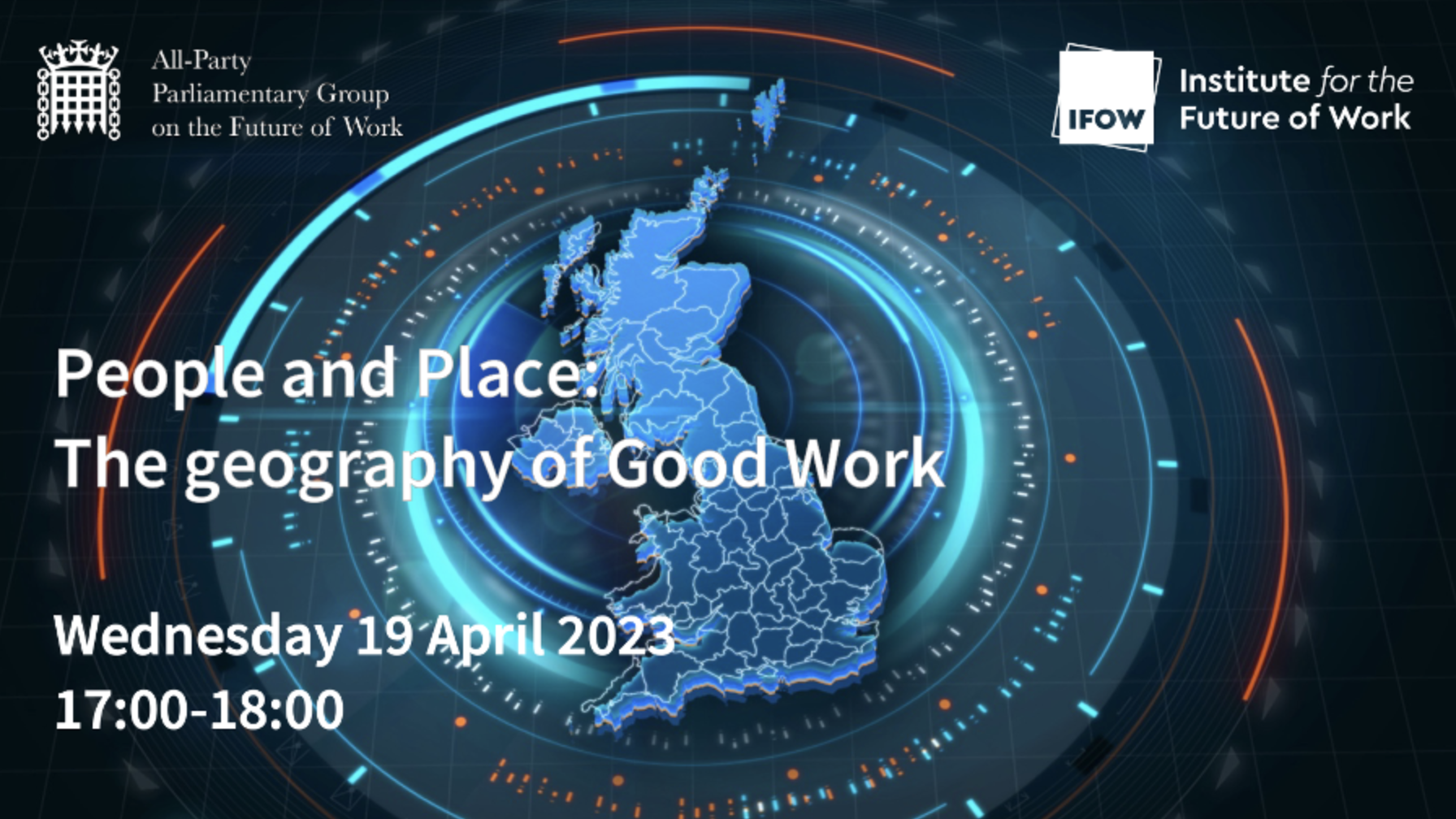
The APPG on the Future of Work hosts a variety of events each year, convening parliamentarians, civil society groups and industry to discuss the key issues around building a fairer future of better work

Good Jobs and Regional Growth
As powers are devolved to local leaders, how can we build inclusive innovation systems that support good jobs and regional growth?

Creative Industries
The APPG for the Future of Work hosts a panel discussion on the challenges and opportunities facing the UK’s creative industries.

Skills for a Thriving Economy
As industries evolve and technology reshapes jobs, how can we ensure that workers and businesses have the skills they need to thrive?
Policymakers, industry leaders, and skills experts joined us as we explored:
The vision for Skills England
The importance of lifelong learning
Key policies to future-proof the UK’s workforce
A key opportunity to engage with leading voices on the future of work and education, we were joined by:
Lord Jim Knight – APPG Co-Chair
Lauren Edwards – MP for Rochester and Strood
Donna Ford-Clarke – VP of Vocational Qualifications and Portfolio at Pearson
Simon Parkinson - Chief Executive and General Secretary of the Workers Educational Association
Dan Howl – Head of Policy and Public Affairs at BCS, The Chartered Institute for IT
Lizzie Crowley – Senior Skills Policy Advisor at the CIPD
Further event details for attendees and full speaker bios can be found in this document.
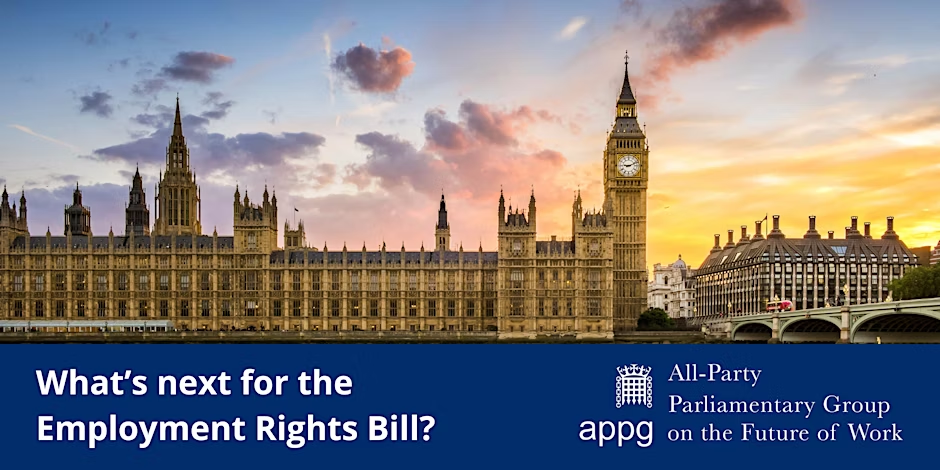
What next for the Employment Rights Bill?
APPG on the Future of Work: What next for the Employment Rights Bill?
Join us for an insightful discussion examining the evolving landscape of employment rights in the UK as the Employment Rights Bill progresses through Parliament. Our expert panel will explore the gaps between policy intentions and implementation, emerging challenges, and the road ahead.
Confirmed:
Lord Jim Knight (APPG Co-Chair)
Professor Simon Deakin (Professor of Law at the University of Cambridge)
Dom Armstrong (Head of Policy, Community Union)
Representatives from Prospect Union and leading law firm, Simmons and Simmons
Scope:
The focus will be on the policy landscape created by the Employment Rights Bill:
Which elements of the White Paper that were missing from the Bill might MPs or groups continue to lobby for in the coming months and years?
What kind of enforcement challenges might already overstretched labour market enforcement bodies experience and where do they need additional resources as a result?
What emerging challenges that might require protections not yet covered within the legislative framework face workers across the country as a result of changes in work and ways of working?
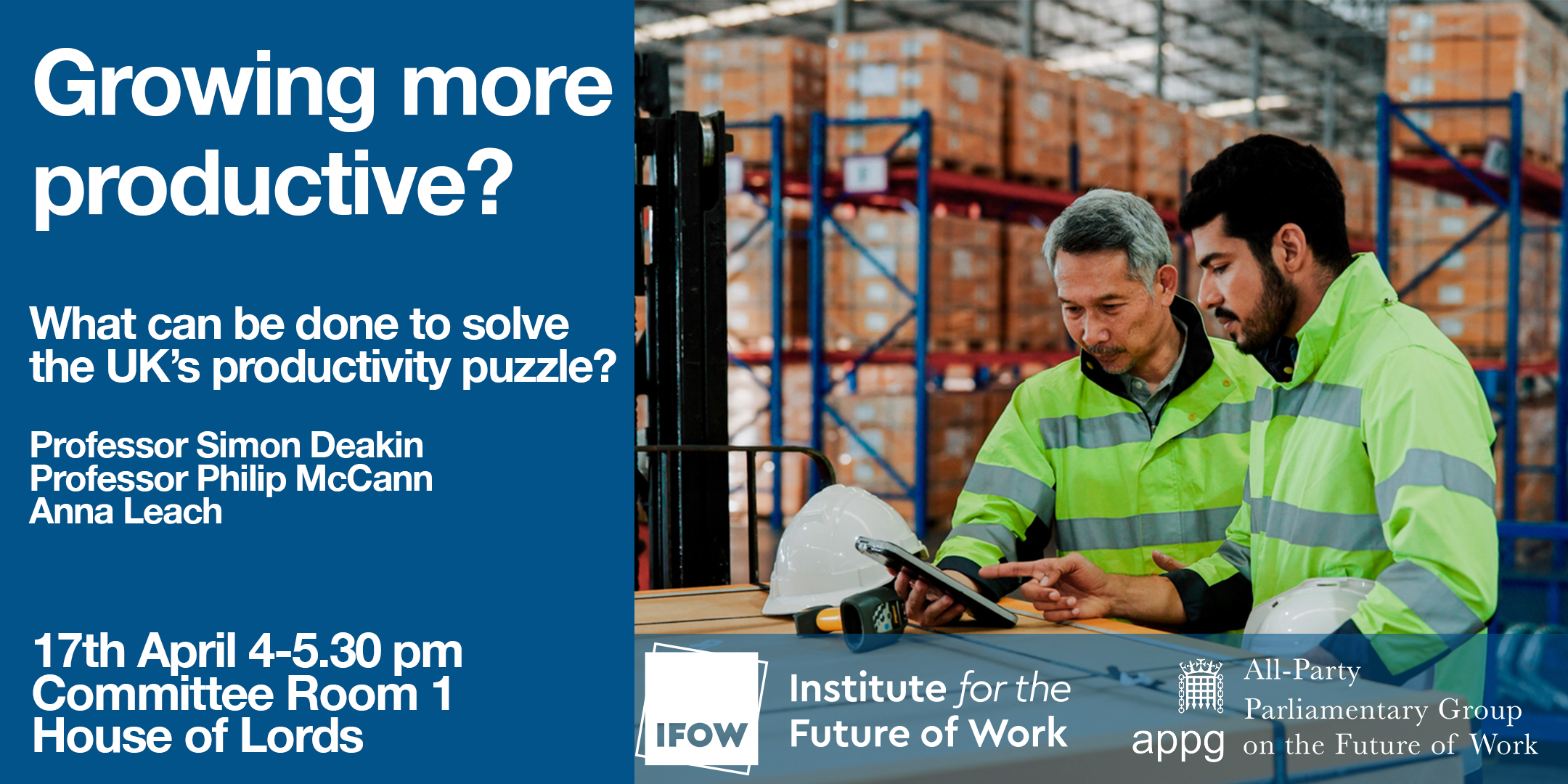
Growing more productive - what can be done to solve the UK's productivity puzzle?
APPG Co-Chairs Matt Warman MP and Lord Jim Knight convene an expert panel to explore how UK productivity and growth can be addressed. Reserve a space here.
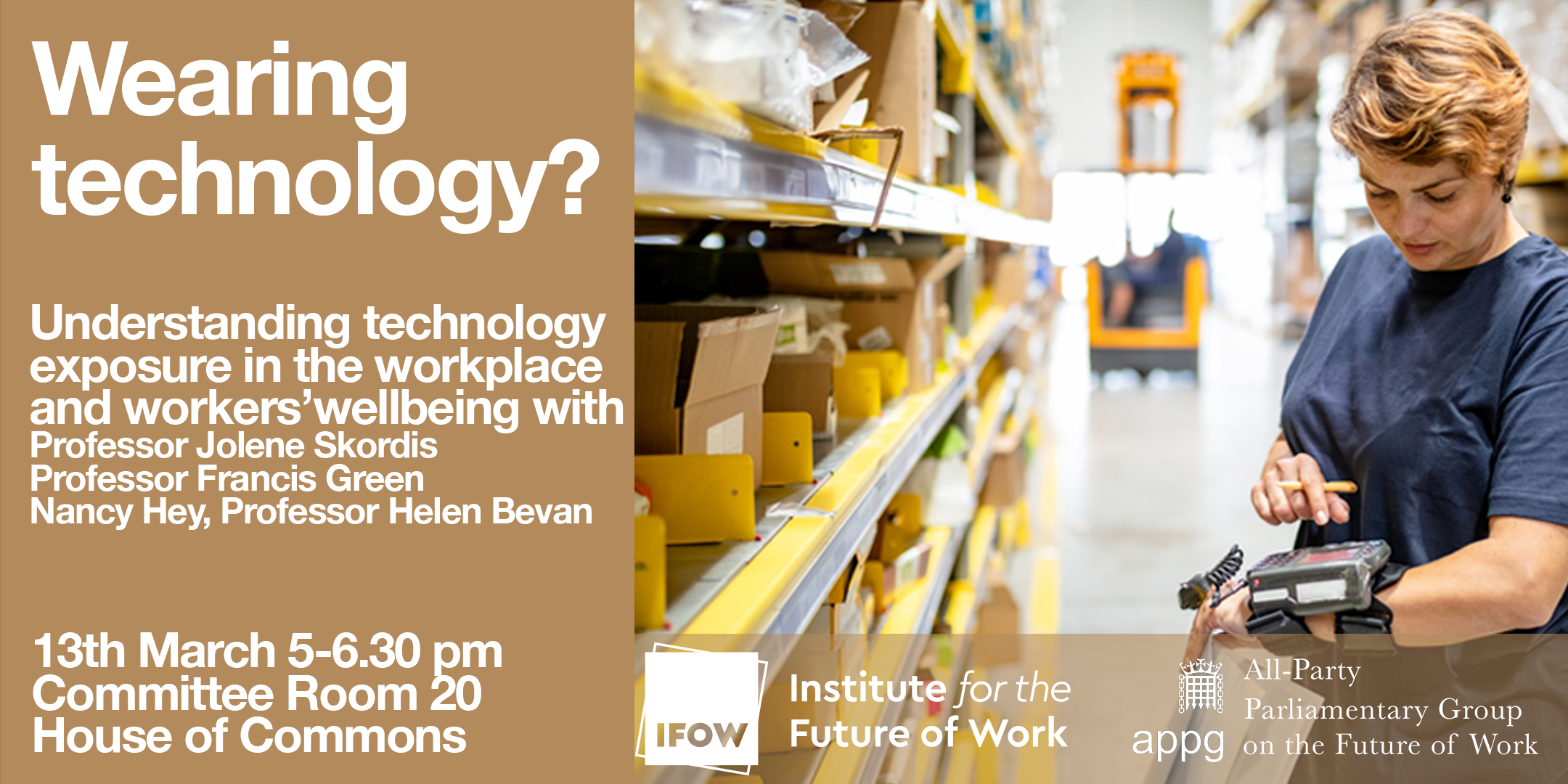
Understanding technology exposure and workers' wellbeing (including EGM for Parliamentary members at 4:45pm)
As part of Matt Warman MP's Future of Work Review, this session will be exploring how exposure to workplace technologies impacts workers' wellbeing.
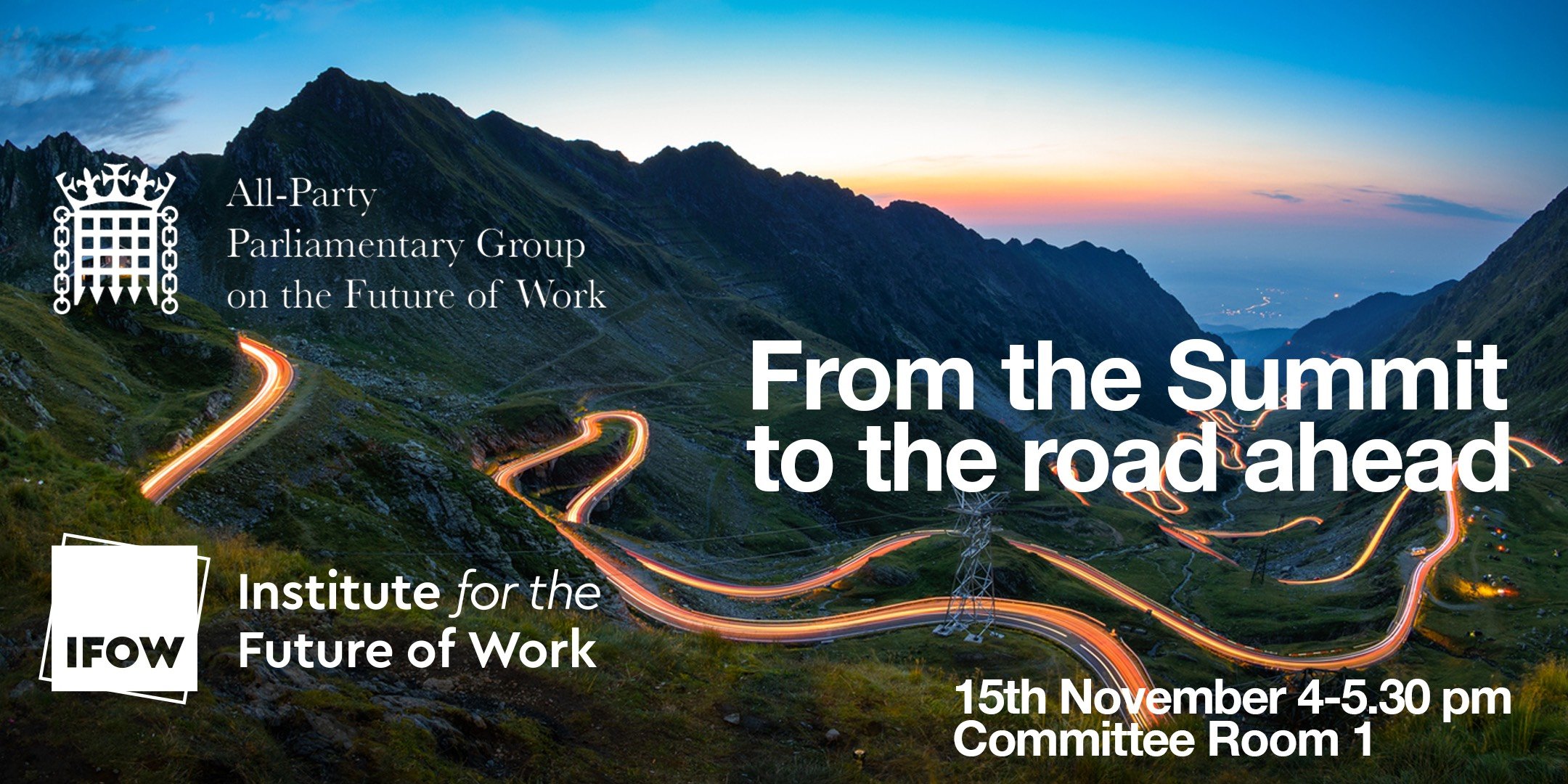
From the Summit to the Road Ahead
Our final APPG event of the year was a chance to reflect on the AI Summit(s) just gone, and on the regulatory and governance frameworks that now need to be put in place to deliver a future where innovation and social good can advance together.
We were joined by our Co-Chairs, Matt Warman MP and Lord Jim Knight, plus a panel of expert voices: Jeni Tennison OBE (Connected by Data), Matt Davies (Ada Lovelace Institute), Nimmi Patel (techUK), Rachel Coldicutt (Promising Trouble) to lead discussion in which members were also invited to take full part.
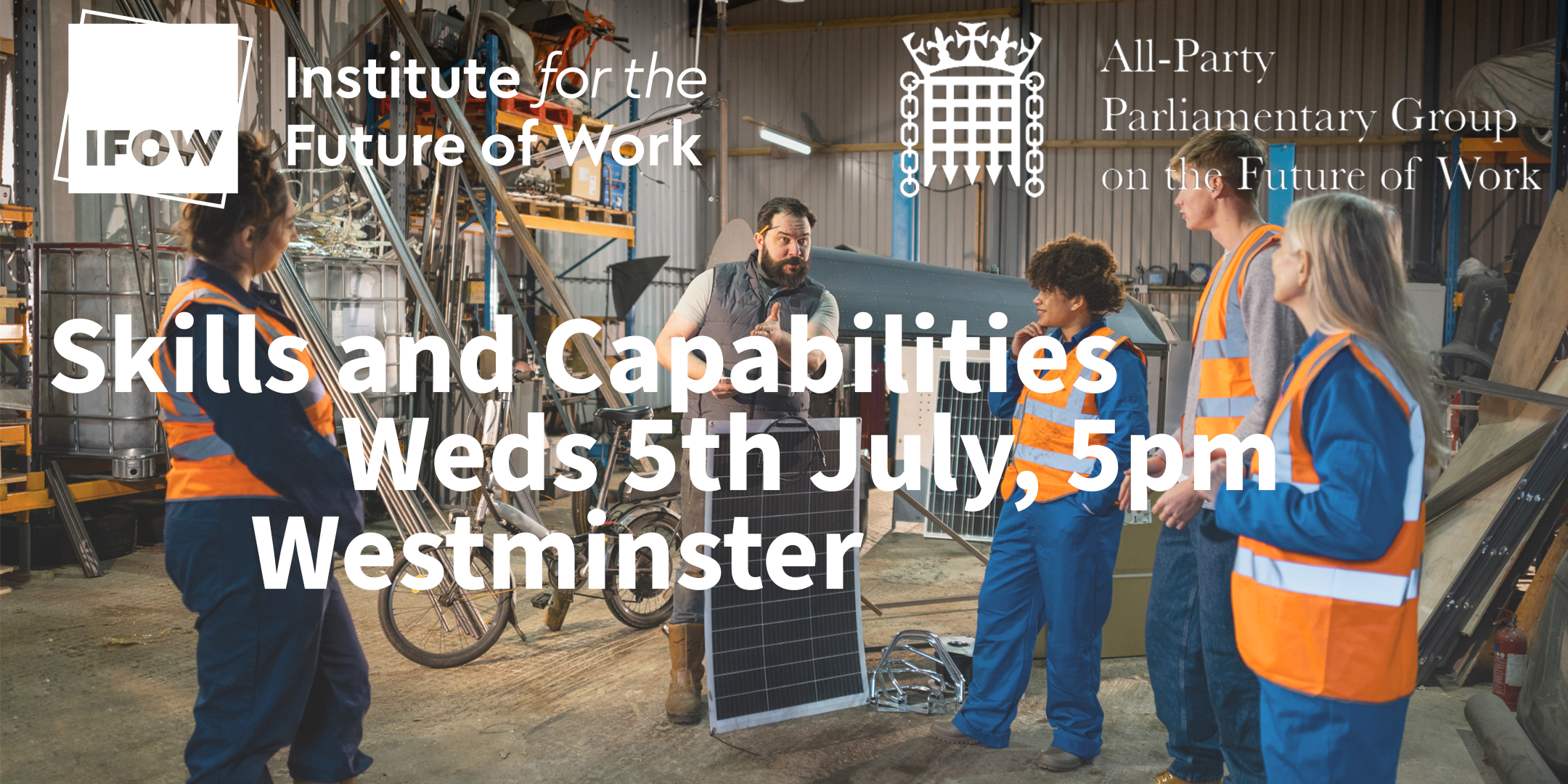
Skills and capabilities - a more human approach?
In this third session of the 2023 UK Future of Work review being conducted by our Co-Chairs Matt Warman MP and Lord Jim Knight, we are delighted to already have confirmed Sir Michael Barber - leading the government's review into skills - and El Iza Mohamedou, Head of Skills at the OECD.
Informing this session will be work from the Pissarides Review into the Future of Work and Wellbeing that IFOW is conducting with funding from the Nuffield Foundation which creates a new mapping of Amartya Sen's Capabilities Approach onto the Future of Work space.
Reserve a ticket here.
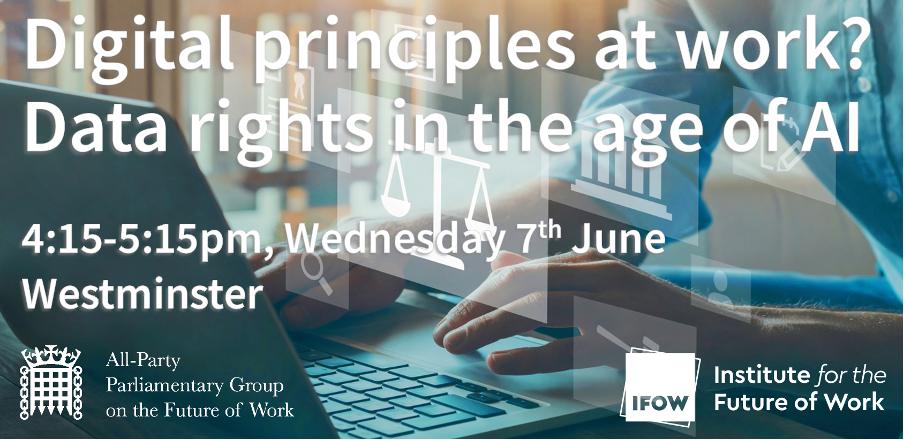
Digital Principles at Work? Data rights in the age of AI
The second session our 2023 Future of Work Review, exploring good work from the perspective of regulation and workplace data rights. Please confirm your attendance here.
People and place - the geography of good work
Access to better quality work is key to promoting prosperity, improving wellbeing and solving deep-rooted place-based inequalities across the UK.
Through 2023, Matt Warman MP, new co-chair of the APPG into the Future of Work, and former lead for the Government’s Future of Work Review, will be completing a review with his co-chair Lord Jim Knight and with support from IFOW as strategic research partner.
This event will be focused on people and place and explore access to good work across the country in this context. In doing so, we will benefit from IFOW's Good Work Monitor and the forthcoming Pissarides Review
During the event, expert speakers will explore some of the following questions:
How are patterns in access to good work across the country changing?
How can good work promote wellbeing and prosperity for people and places across the country?
Which policy and other levers are available to create and sustain good work across the country?
How could national and local Future of Work strategies be developed implemented?
Co-chairs: Matt Warman MP, Jim Knight, Lord Knight of Weymouth
Introduction to the event: Anna Thomas, Director of IFOW
Speakers:
Guy Opperman MP, Minister of State for Employment
Professor Philip McCann, Chair of Urban and Regional Economics, Alliance Manchester Business School
Professor Sir Christopher Pissarides, Nobel Laureate, Regius Professor of Economics, LSE and lead of the Pissarides Review into the Future of Work and Wellbeing.
Register here for the event.

APPG AGM
You are cordially invited to attend the AGM of the APPG on the Future of Work next Tuesday, 28th February, from 230-3pm in Room T, Portcullis House.
This will be a short but important 30 minute meeting to undertake elections of Co-chairs and Vice-chairs.
As the key parliamentary hub for research into the future of work, we will also be setting out a programme of events for the coming year exploring four key areas of focus at this critical period of technological and labour market transition.
The IFOW team very much look forward to seeing you there.
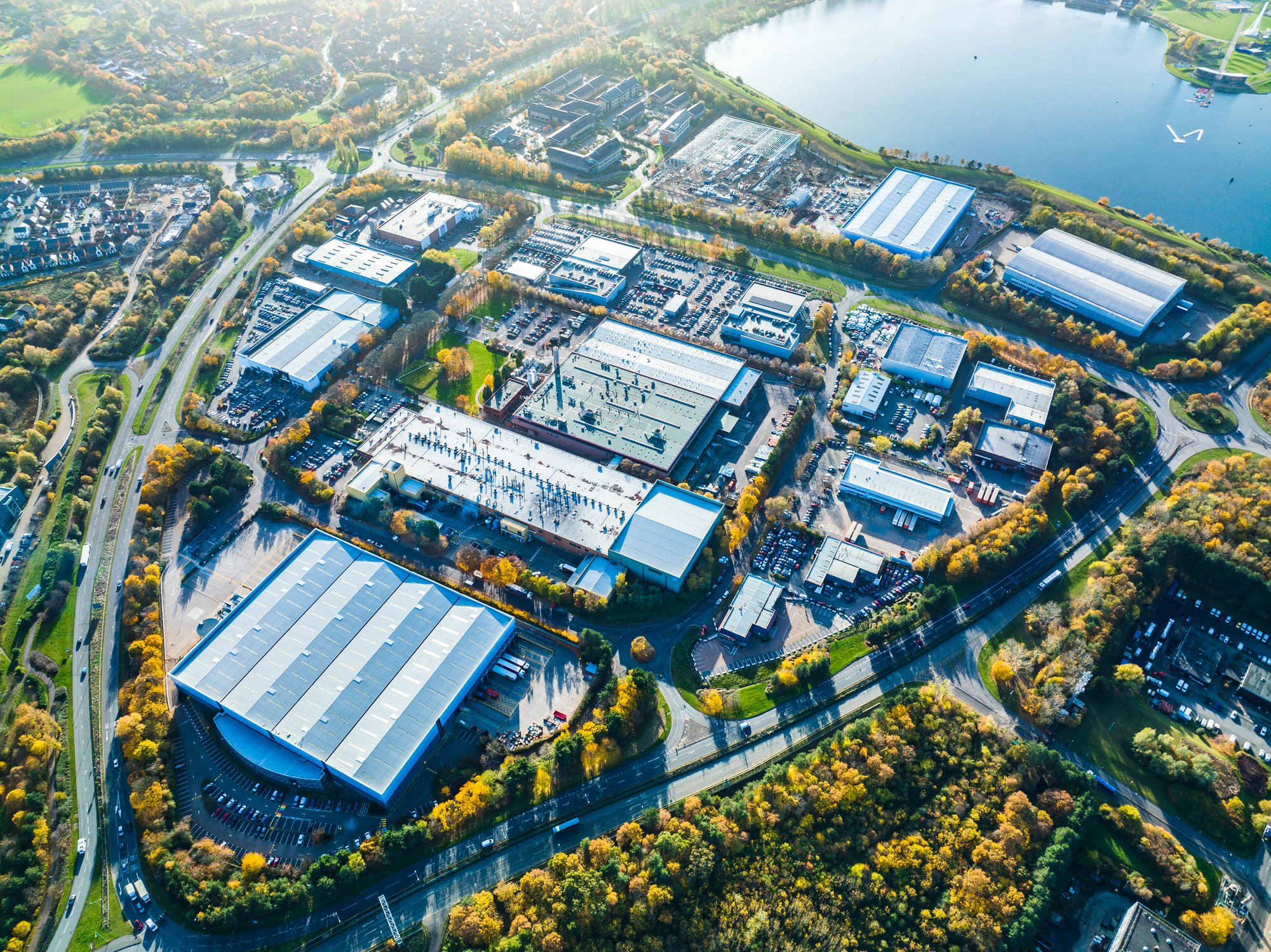
The Future of Work and Wellbeing Conference
The Secretariat for the APPG on the Future of Work are delighted to be co-hosting this conference for The Pissarides Review into the Future of Work and Wellbeing, funded by The Nuffield Foundation. Members of the APPG are cordially invited to join us for this full-day event, with a stellar line-up of speakers.

Regulating AI at work: What’s next?
Join this APPG on the Future of Work session to explore the role of the UK's regulators, the Centre for Data Ethics and Innovation (CDEI) and new AI Standards Hub to promote future good work as part of building a responsible AI ecosystem.

The future is flex: Flexible working is here to stay, companies and policy need to adapt
Join this APPG on the Future of Work event to explore key questions when it comes to flexible working, including:
Is flexible working the future of work?
What does ‘good’ flexible working look like?
To what extent does flexible working contribute to the wellbeing and equality of workers?
What digital rights are needed for the new working era and is a right to flexible working enough?
What new infrastructures are needed to support flexible working e.g. free childcare, working spaces nearer home etc?
How can we ensure that those working flexibly are able to progress their careers/are not at a disadvantage of fewer development opportunities?
Chair: David Davis MP
Confirmed speakers:
Emma Stewart, Development Director, Timewise
Kate Bravery, Global Advisory and Insight Leader, Mercer (Marsh McLennan)
Abigail Marks, Professor of the Future of Work, Newcastle University Business School
Anna Thomas, Director, Institute for the Future of Work

International learnings on algorithmic impact assessments
The development of new technologies, including those powered by AI and machine learning, is transforming the world of work. As highlighted in a recent Institute for the Future of Work report, 'algorithmic systems are being used across the economy to control fundamental aspects of work’.
The UK's National AI Strategy also recognises that the impact of AI on the UK, and the wider world will be profound over the next decade. However there is still widespread misunderstanding of the risks that data-driven systems pose, as well as lack of confidence among business leaders as to how they can act responsibly to avoid them. There is therefore a need for pre-emptive action in the design and deployment of data-driven tools at work.
In this APPG on the Future of Work event, we explore how algorithmic impact assessments (AIAs) are gaining traction internationally as a regulatory strategy for addressing and correcting algorithmic harms, and specifically in a workplace context.
Chair: Lord Tim Clement-Jones
Speakers:
Benoit Deshaies, A/Director, Data and Artificial Intelligence, Treasury Board of Canada Secretariat
Brittany Smith, Policy Director, Data & Society
David Leslie, Director of Ethics and Responsible Innovation Research, Alan Turing Institute
Anna Thomas, Director, Institute for the Future of Work
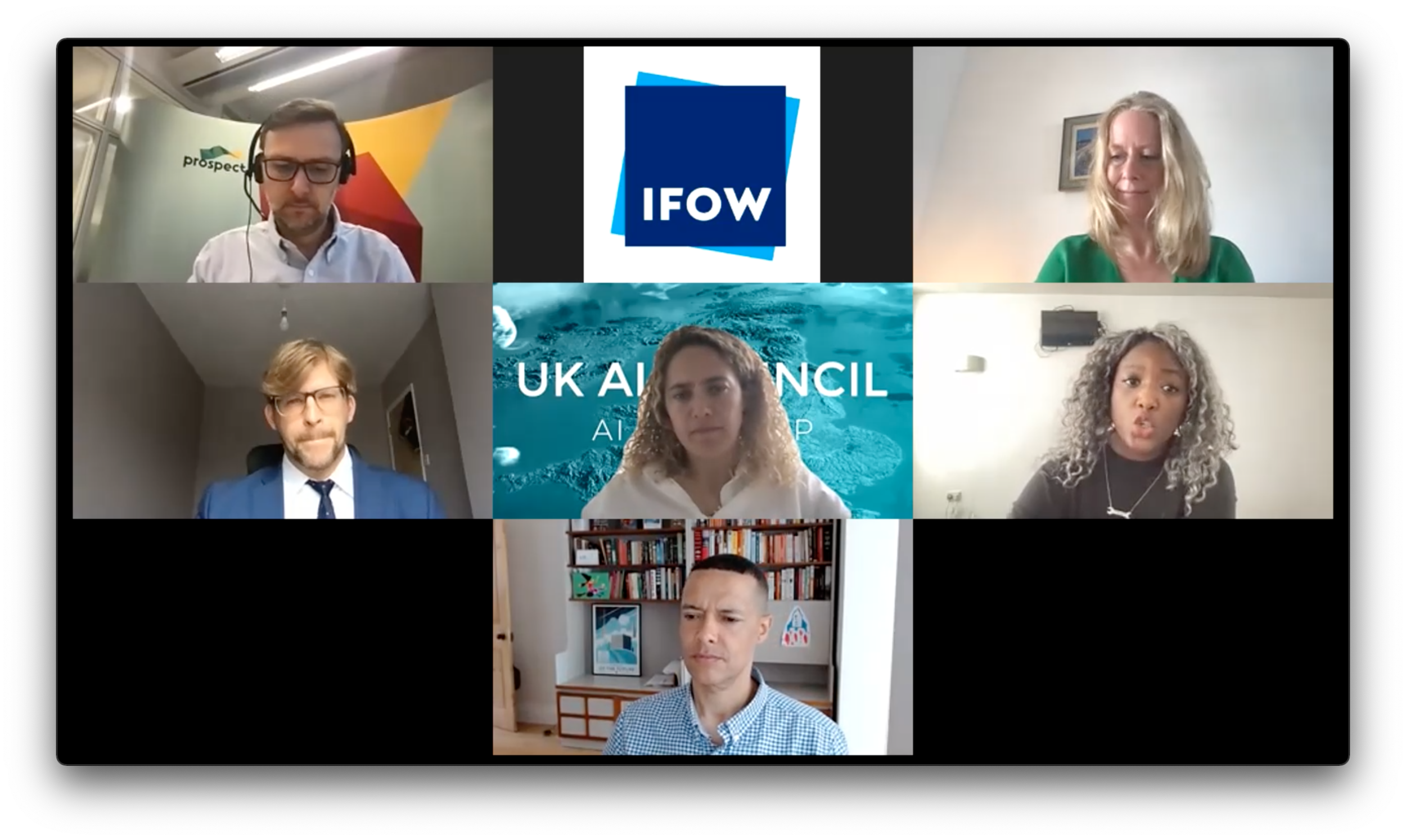
APPG for the Future of Work Inquiry into Artificial Intelligence and Surveillance in the Workplace | Session Three: Next Steps
The expert panel included:
Anne-Marie Imafidon MBE- Anne-Marie is Head Stemette and co-founder of Stemettes – an award-winning social enterprise inspiring girls and young women into Science, Technology, Engineering and Mathematics roles. Anne-Marie is a Trustee at the Institute for the Future of Work.
Tabitha Goldstaub- Tabitha is the chair of the UK government's AI Council and a member of the TechUK board. Tabitha is the co-founder of CogX, a festival and online platform that enables thousands of thought leaders to host their own public or private live video sessions and build interactive meaningful conversations with their audience.
Andrew Pakes- Andrew is the Research Director and one of the Deputy General Secretaries at Prospect Union representing over 152,000 members across tech, specialist, engineering and professional roles. He leads Prospect’s work around tech, AI, data rights and the future of work. He is also a Visiting Fellow at the ESRC funded Digital Futures of Work Research Centre looking at worker experiences of digital surveillance.
David Leslie- David is the Ethics Theme Lead at the Alan Turing Institute. He is the author of the UK Government’s official guidance on the responsible design and implementation of AI systems in the public sector, a co-badged guidance on AI explainability published by the Information Commissioner’s Office and The Alan Turing Institute.
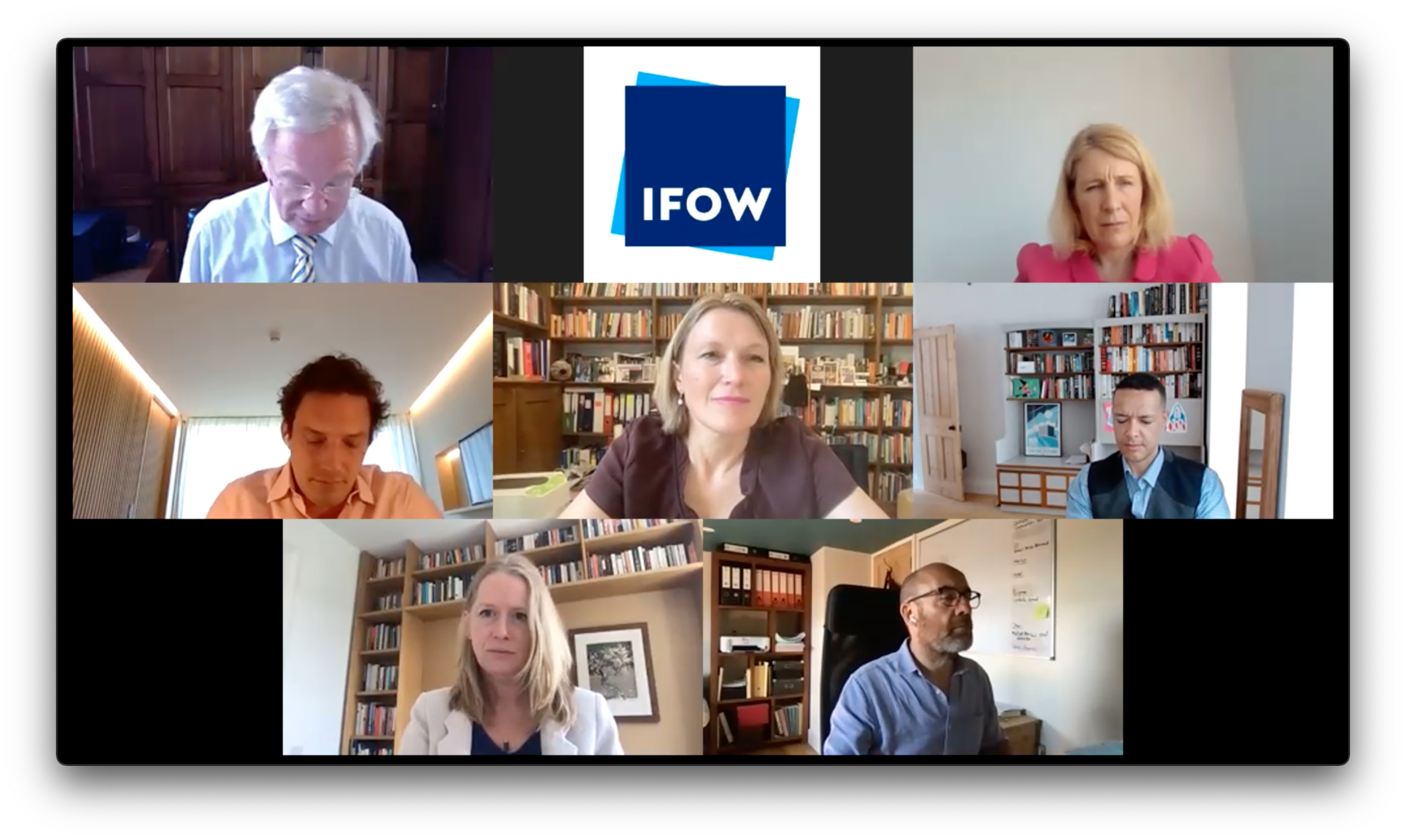
Inquiry into Artificial Intelligence and Surveillance in the Workplace | Session Two: How the Law Applies
APPG for the Future of Work Inquiry into Artificial Intelligence and Surveillance in the Workplace | Session Two: How the Law Applies
The expert panel included:
Helen Mountfield QC- Helen is a renowned practitioner and expert in constitutional, human rights and equality law. Helen was co-chair, of the independent Commission on the Future of Work and chair of the Institute for the Future of Work’s Equality Task Force.
Emma Wright- Emma is Director of the Institute of AI, a cross party non-profit, working with legislators across the globe.
Jeremias Adams-Prassl- Jeremias is Professor in the Faculty of Law at the University of Oxford. Jeremias is primarily interested in Employment Law and European Union Law. He is the author of The Concept of the Employer, a co-editor of The Autonomy of Labour Law, and one of the editors of The Contract of Employment.
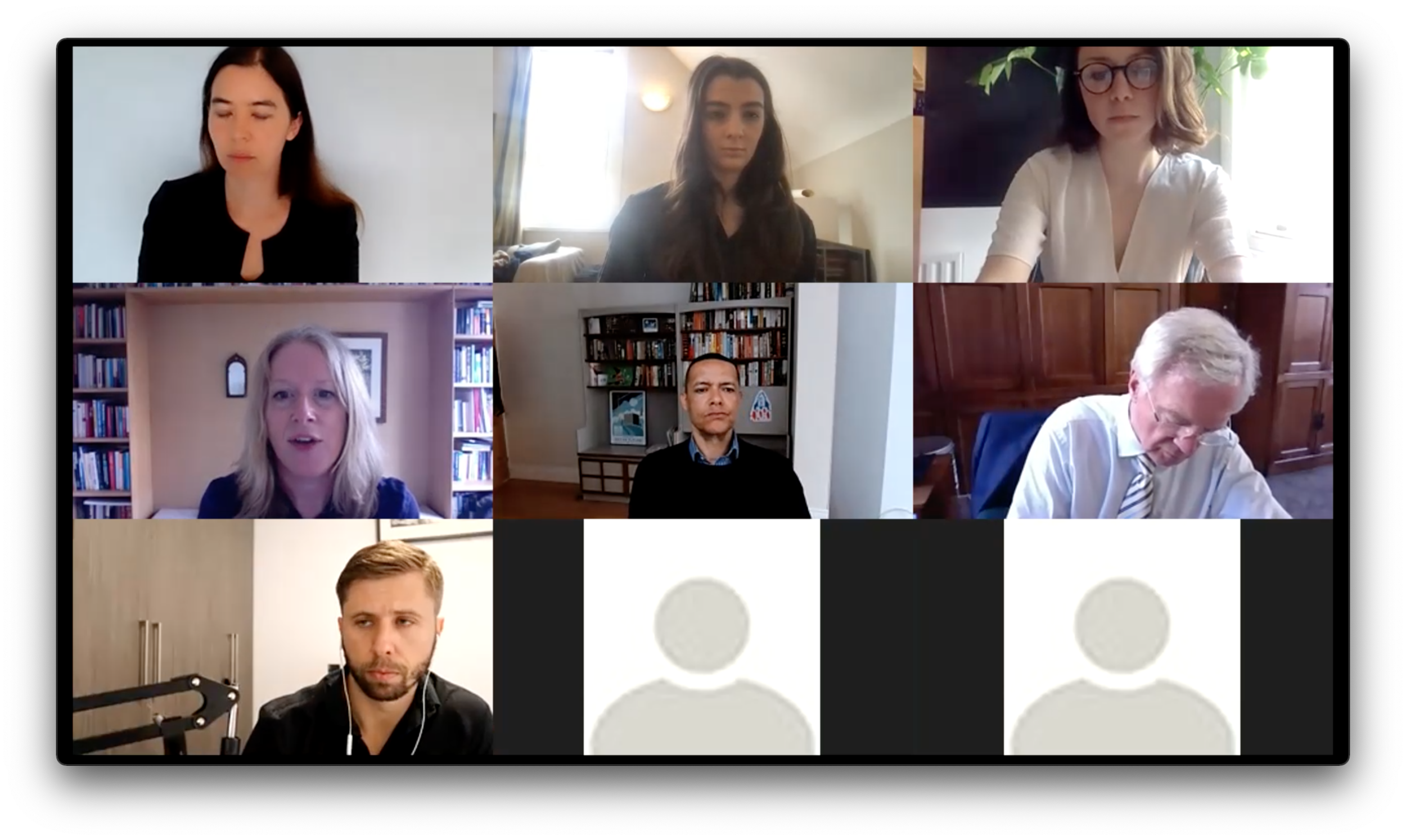
Inquiry into Artificial Intelligence and surveillance in the workplace | Session one: What’s happening?
APPG for the Future of Work Inquiry into Artificial Intelligence and Surveillance in the Workplace | Session One: What’s happening?
The expert panel included:
Mary Towers- Mary is Employment Rights Officer at the Trade Union Congress, leading on the TUC’s research on the use of AI in the employment relationship.
Dr Abby Gilbert- Abby is the Principal Researcher at the Institute for the Future of Work. Abby has spent the last year and a half researching the use of algorithmic systems at work across essential service sectors.
James Bloodworth- James is a writer and journalist. He is a former editor of the blog Left Foot Forward, and his work has appeared in the Guardian, Spectator, Independent and Wall Street Journal. James is the author of ‘Hired: Six Months Undercover in Low-Wage Britain’ (2018), which has been longlisted for the 2019 Orwell Prize.
Work and Wellbeing: Levelling up the UK
The COVID-19 pandemic has upended our world of work and amplified the underlying inequalities in our society. We have seen the gulf widen between those in good work and those whose working lives are precarious an uncertain. As IFOW’s Good Work Monitor shows, poor conditions for work and low availability of good work are closely related to poor health outcomes. ‘Bad’ work is associated with disease and deaths of despair before the pandemic, and COVID-19 mortalities after it.
This session will explore the role that better, fairer work could play in recovery plans and levelling up across the country. We ask our expert panelists: What role does good work play in building strong, resilient communities across the country? Would a focus on building the conditions for good work reduce growing inequalities in work and health? And how can we best align health, social and economic interests in recovery plans?
Clive Lewis MP - Chair
Clive Lewis was elected the Labour MP for Norwich South in May 2015 and is co-Chair of the APPG for the Future of Work. He has been Shadow Minister for Climate & Energy Change, Shadow Secretary of State for Defence and Shadow Secretary of State for Business, Energy and Industrial Strategy. Clive has also served as a Shadow Minister for the Treasury, with a focus on Environmental Economics and Sustainable Finance.
Andy Burnham
Andy Burnham was elected the Mayor of Greater Manchester in 2017, and has previously held Ministerial positions at the Home Office, Department of Health and the Treasury. In 2008 he became Secretary of State for Culture, Media and Sport, before returning to Health as Secretary of State in 2009.
Dr. Jennifer Dixon
Dr Jennifer Dixon is the CEO of the Health Foundation. Originally trained in medicine, Jennifer practised mainly paediatric medicine, prior to a career in policy analysis. Prior to working at the Health Foundation, Jennifer was Chief Executive of the Nuffield Trust from 2008 to 2013, Director of Policy at The King’s Fund and was the policy advisor to the Chief Executive of the National Health Service between 1998 and 2000.
Professor Sir Michael Marmot
Professor Sir Michael Marmot is the Professor of Epidemiology at University College London and Past President of the World Medical Association. Professor Marmot has led research groups on health inequalities for over 40 years. He was Chair of the Commission on Social Determinants of Health (CSDH), which was set up by the World Health Organization in 2005, and produced the report entitled: ‘Closing the Gap in a Generation’ in August 2008. At the request of the British Government, he conducted the Strategic Review of Health Inequalities in England, which published its report 'Fair Society, Healthy Lives' in February 2010. In February 2020, he launched the ‘Marmot Review 10 Years On’ report on the health inequalities across England.
Professor Patricia Findlay
Professor Findlay is a leading expert in work and employment relations, and Director of the Scottish Centre for Employment Research at the University of Strathclyde. Since 2017 Professor Findlay has been co-Chair of the Scottish Fair Work Convention, and has worked in a number of government advisory roles, notably as Chair of Research and Analysis for the Women's Employment Summit.
Jamie Driscoll
Jamie Driscoll is the Mayor of the North of Tyne Combined Authority. After leaving school at 16, Jamie returned to education as a mature student to gain an engineering degree at Northumbria University. He worked as an engineer making breathing apparatus and in the electronics and IT sector, later setting up his own software development firm. Before being elected to the Office of Mayor, North of Tyne, Jamie was a Labour and Cooperative Councillor in the Monument Ward in Newcastle City Centre.
Rethinking Automation: the nature of work after Covid
Automation is transforming our work, lives and society. It can drive productivity, create new jobs and reduce the hazards of human contact. But acceleration of technology adoption through the pandemic has shown that benefits are not evenly spread. At this critical moment, we ask our world-class panellists: how is automation changing work and skills? What are the consequences for society? And how can policy-makers respond?
Join us for the launch event of the first event of the All-Party Parliamentary Group on the Future of Work and Institute for the Future of Work joint events programme. Prospect are the Union Chair to the APPG on the Future of Work.
Speakers:
Professor Sir Chris Pissarides, Co-Chair of the Institute for the Future of Work and Nobel Laureate in Economics
Saadia Zahidi, Managing Director of the World Economic Forums’ Centre for New Economy and Society
Professor David Autor, Professor and Associate Head of MIT Department of Economics
Co-chairs: David Davis MP and Clive Lewis MP
This event will be introduced by Anna Thomas, Director of the Institute for the Future of Work
Parliamentary Debate on Automation and the Future of Work
Parliamentary Debate on Automation and the Future of Work - 19th November 3pm-5pm
IFOW are proud to provide research partner and secretariat functions to the new All Party Parliamentary Group on the Future of Work, working in partnership with Prospect union. On the 19th of November, following the APPG’s formal inauguration on the 3rd of November, members of the APPG will take part in a backbench debate on the future of work.
You can watch the debate, to be held in Westminster Hall, live through the Parliamentary TV website and we will be convening live debate for those following using the hashtag #APPGFutureOfWork. The full background brief is here.
The context for the debate:
COVID-19 has disrupted the labour market significantly. Polling by the Institute for the Future of Work finds that one in three workers who are in work are looking for a new job; two thirds of them motivated by COVID-19. Andy Haldane, Chief Economist at the Bank of England has noted that we may be returning to 1980s levels of unemployment. The consequences and fall out of this are unevenly distributed demographically and regionally.
COVID-19 is changing our access and conditions of work but our research has also shown changes to the nature and experience of work, linked to the increasing use of technology. A poll by the Institute for the Future of work found 41% believe that digital technology will affect their jobs in the foreseeable future. While 61% feel that consultation about its introduction will make their work more effective, just 36% report this is actually happening.
IFOW reconvened the independent Commission on the Future of Work in an emergency session to identify new challenges and make recommendations for consideration by Government. Against this background, the parliamentary debate will consider the impact of COVID-19 on the use of automation technologies at work, including the need for cross-disciplinary research; to prioritise a strategy for the human-centred design and adoption of technology; for a forum to enable dialogue and collaboration between government, business, unions and academics; and to innovate, pilot and deliver practical solutions in response to key challenges and opportunities aimed at shaping a future of better work.


